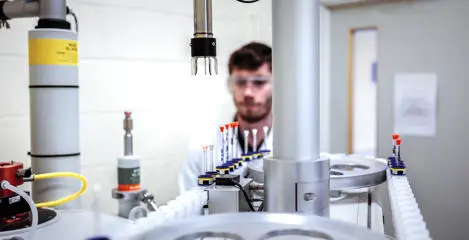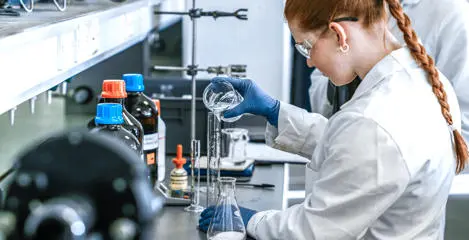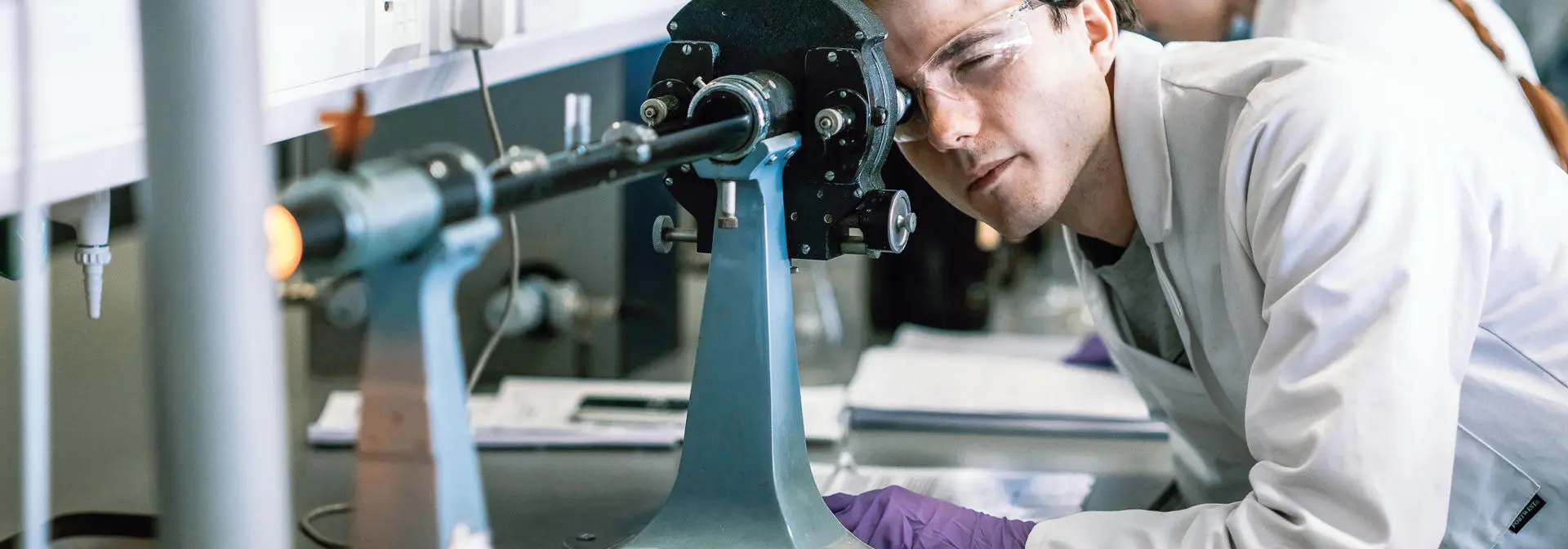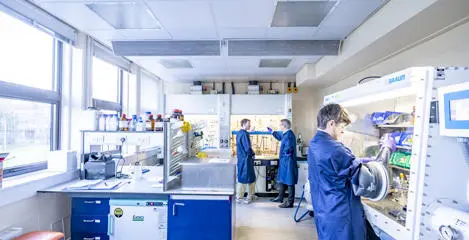Key information
- UCAS code
- F1M2
- Level
- Undergraduate
- Delivery type
- Full Time
- Degree qualification
- MChem
- Mode of delivery
- On-Campus
- Duration
- 4-5 years
- Location
- Edinburgh
- Start date
- September
This career-focused MChem Medicinal Chemistry degree has been developed to equip students with the necessary expertise to excel in pharmaceutical and drug development settings. The programme at Heriot-Watt University offers a rigorous and modern education tailored to those passionate about the science behind medicines and the fight against disease.
Over five years, you will build a strong foundation in core chemistry disciplines — including chemical reactivity, molecular structure and bonding, spectroscopy, and organic synthesis. As you progress, your studies will increasingly focus on medicinal chemistry topics such as pharmacology, enzyme kinetics, drug design, molecular modelling, and pharmaceutical analysis, as well as the use of AI and machine learning in drug development.
Hands-on laboratory work is embedded throughout the course, developing your technical skills and reinforcing theoretical knowledge. You'll gain confidence in experimental design, data interpretation, and scientific communication — essential skills for careers in the pharmaceutical and biotech industries.
The MChem degree provides a clear and structured pathway into roles such as drug discovery scientist, pharmaceutical analyst, and toxicologist. Graduates are well-equipped for employment or for pursuing further study, including PhD programmes. This programme responds to growing demand for expertise in medicinal and pharmaceutical chemistry, combining scientific depth with practical training to prepare you for a rewarding future in healthcare and life sciences.
Your student experience
Your learning will be informed by research-active staff with expertise in pharmaceutical and medicinal chemistry. Heriot-Watt has a long-standing reputation in this field, supported by academics who are internationally recognised in synthetic chemistry, molecular biology, cell biology and pharmacology. Staff contributing to the programme are based across the Institute of Chemical Sciences (ICS) and the Institute of Biochemistry, Biophysics and Bioengineering (IB3).
Teaching is directly informed by research, including work on drug design and delivery, and underpinned by excellent facilities such as a continuum flow lab for automating chemical synthesis. The Medicinal Chemistry programme draws upon established pharmaceutical expertise at Heriot-Watt, whilst interdisciplinary biological sciences links will further enrich your learning.
Research in ICS is divided into three main research groupings:
The research and industry focused nature of this undergraduate programme ensures your studies remain innovative and up to date with current and emerging trends.
Go Global
There are currently no Go Global opportunities for this particular programme. However, other Go Global opportunities may be available. Please contact studywithus@hw.ac.uk for more information.
Course content
September Intake - Edinburgh
Year 1
Mandatory September
- Principles of Chemistry
- Introductory Chemistry Lab and Skills 1
- Mathematics for Engineers and Scientists 1
- Introductory Biology 1
Mandatory January
- Chemical Reactivity
- Introductory Chemistry Lab and Skills 2
- Mathematics for Engineers and Scientists 2
- Introductory Biology 2
Year 2
Mandatory September
- Introduction to Mechanisms and Spectroscopic Analysis
- Quantum Mechanics and Bonding
- Foundations of Drug Targeting
Mandatory January
- Synthesis, Solutions and Potentials of Molecules
- Energy Levels to Structure
- Introduction to Microbiology
Mandatory AY
- Intermediate Chemistry Lab and Skills
Year 3
Mandatory September
- Chemical Reaction Rates and Mechanisms
- Organometallic Chemistry and Spectroscopy
- Introduction to Pharmaceutical Chemistry
Mandatory January
- Modern Synthetic Chemistry
- Principles of Drug Discovery & Development
Optional January
- Molecular Biology
- Medical Microbiology
- Cell and Molecular Biology
Mandatory AY
- Advanced Chemistry Lab and Skills
Year 4
Mandatory September
- Advanced Pharmacology
- Project Execution, Regulation and Data
Mandatory January
- Human Diseases and Therapeutic Interventions
- Analytical Chemistry
Mandatory AY
- Chemistry Dissertation Project
- Sustainable Synthesis and Catalysis
Year 5
Mandatory September
- Current Research in Chemistry A
Mandatory January
- Advanced Applications of Modern Synthetic Chemistry
Mandatory AY
- MChem Research Project
Optional September
- Computer Simulations of Molecules
- Pathobiology of Human Disease
- Biotechnology
- Toxicology
Optional January
- Emerging Issues and Innovations in Toxicology
- Chemistry of Food
Disclaimer
The courses mentioned above may change between now and the time that you study. For more information, please view our Terms and Conditions.
Programme Video
Chemistry at Heriot Watt
Fees and funding
| Status | Fee |
|---|---|
| Scotland | Paid by SAAS |
| England / Wales / N Ireland / Rep of Ireland | £9,790 |
| International | £25,808 |
- Status: Your residency status is usually defined as the country where you have been ordinarily resident for the three years before the start of your course.
- International: 'International' includes applicants from European Union countries who do not hold Pre-Settled or Settled status in UK. (This does not include students from the Republic of Ireland - see above).
Scholarships and bursaries
Bursaries for students from England, Northern Ireland or Wales
In addition to government loans and grants towards the costs of fees and living costs, we are offering generous financial support to attract and support eligible undergraduate students from England, Northern Ireland or Wales:
- Heriot-Watt University Bursary (up to £3,100 per year)
Entry requirements
We have standard entry requirements for all of our courses that you will have to meet.
Year 1
Standard entry requirements
- Highers AAAB (over two sittings). Must include Chemistry at A, and one of Maths or Physics or Engineering Science at B.
- A-Levels BBB. Must include Chemistry at B, and either Maths or Physics at B.
- International Baccalaureate 30 points. Must include Chemistry at Higher Level 5 and either Maths or Physics at Higher Level 5.
- BTEC Extended Diploma DDM. Must be relevant science subject including sufficient Chemistry and Maths.
- HNC A in graded unit. Must be relevant science subject including sufficient Chemistry and Maths.
- HND BB in graded unit. Must be relevant science subject including sufficient Chemistry and Maths.
Please check that you meet our University-wide National 5/GCSE (or equivalent) English and Maths requirements.
Minimum entry requirements *
- Highers BBBC (over two sittings). Must include Chemistry at B, and one of Maths or Physics or Engineering Science at B.
- A-Levels BCC. Must include Chemistry and either Maths or Physics, with one required subject at B.
- International Baccalaureate 28 points. Must include Chemistry and Maths, both at Higher Level 5.
- BTEC Extended Diploma DMM. Must be relevant science subject including sufficient Chemistry and Maths.
- HNC B in graded unit. Must be relevant science subject including sufficient Chemistry and Maths.
- HND BB. Must be relevant science subject including sufficient Chemistry and Maths.
* Minimum: under our Fair Access Policy, we will relax our standard entry requirements for some Scottish and Rest of UK status students depending on their circumstances. Our minimum requirements will apply if you:
- live in an area within the Scottish Index of Multiple Deprivation lowest 20% (SIMD20) or POLAR4 Quintile 1 regions (RUK)
- or are care experienced.
We can also make exceptions for some Scottish students with grades above minimum but below standard. Read more about our Minimum and standard entry requirements.
Year 2
Year 2 entry, including progression from Global College will be available from September 2027.
- Advanced Highers AB. Must include Advanced Higher Chemistry and Maths, and meet Year 1 Higher AAAB requirements.
- A-Levels BBB. Must include Chemistry and Maths.
- International Baccalaureate 34 points. Must include Chemistry and Maths at HL 6.
- BTEC Extended Diploma DDD. Must be in relevant science subject, including sufficient Chemistry and Maths.
- HNC. Not available.
- HND BB. Must be relevant science subject including sufficient Chemistry and Maths.
- Global College Successful completion of our Science with Foundation.
Additional information
- For all years, applications are welcomed from holders of non-school qualifications, mature candidates and overseas students.
- If you do not see your qualifications here please contact us at studywithus@hw.ac.uk
- For applicants studying HNC, HND or BTEC qualifications, when submitting your application please ensure you list in full all the units you are currently studying, as specific units (e.g. in Maths) may be required.
English language requirements
If your first language is not English, we'll need to see evidence of your English language ability.
The minimum English language requirement for entry to this programme is IELTS 6.0 (or equivalent) with no score lower than 5.5.
If you do not have IELTS 6.0, we offer a range of English language courses to help you meet the English language requirement for this programme prior to commencing your studies.
Please see our detailed English language requirements.
Why Heriot-Watt
We're the top university in Scotland for graduate outcomes which means that more of our graduates are employed or in postgraduate education than any other institution in the country and we ranked 5th in the UK.
We're also rated number one in the UK for CEO or MD roles, meaning more of our graduates go on to become CEOs or MDs than any other university in the whole of the UK. On top of that, we have beautiful campuses, across the globe, so you'll get a truly international education. Our Edinburgh Campus is home to Oriam, Scotland's National Sports Performance Centre combined with plenty of wellbeing resources, prioritising fitness and mental health for all students. Our Global Research Institutes look at solving real world issues such as climate change and saving our oceans as well as working on the next medical technological breakthrough and the future of AI and robots.
Employability
Potential career paths
- Natural and social science professionals
- Teaching Professionals
- Science, engineering and technology associate professionals
Student life
Explore facilities, and chat to staff and students
Discover Uni course data
Discover Uni provides data on each university's degree courses across a range of measures including student satisfaction, graduate jobs and salaries.
Contact our enquiries team
Contact usRelated programmes

BSc (Hons) Medicinal Chemistry








